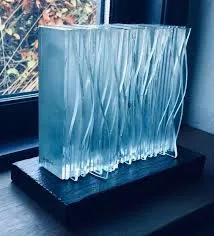The Role of Horticultural Float Glass in Modern Agriculture
Horticultural float glass, a specialized type of glass, plays an essential role in the agricultural industry, particularly in plant cultivation and greenhouse management. Its unique properties make it an ideal choice for structures that aim to optimize plant growth while protecting delicate crops from harsh environmental conditions. This article explores the characteristics, advantages, and implications of using horticultural float glass in modern agriculture.
Float glass is manufactured through a procedure where molten glass is floated on a layer of molten tin. This process results in a smooth, uniform thickness and a high level of clarity. Horticultural float glass is specifically designed for greenhouses and similar structures where light transmission is crucial for photosynthesis. The glass allows a significant amount of natural sunlight to penetrate, creating an ideal environment for plant growth.
One of the primary advantages of horticultural float glass is its excellent light transmission properties. Unlike other materials, such as acrylic or polycarbonate, float glass can transmit up to 90% of light, which is vital for photosynthesis. This high light transmittance leads to healthier, more robust plants and can significantly enhance yields. Additionally, the glass provides a consistent light spectrum, essential for various stages of plant development.
In addition to its light transmission capabilities, horticultural float glass is incredibly durable and resistant to environmental factors. It can withstand various weather conditions, including heavy rain, strong winds, and intense sunlight. This durability ensures that greenhouses and other structures remain intact and functional over time, providing a stable environment for crops. Moreover, float glass is also resistant to UV radiation, which helps in protecting plants from potential damage caused by excessive sunlight.
horticultural float glass
Another critical aspect of horticultural float glass is its insulating properties. While glass is often perceived as a poor insulator, modern horticultural glass incorporates energy-efficient technologies, such as low-emissivity (Low-E) coatings. These coatings minimize heat loss while allowing maximum light penetration, ensuring that the internal climate of the greenhouse remains stable. This temperature control is crucial for promoting year-round plant growth, even in regions with extreme weather conditions.
Sustainability is a growing concern in modern agriculture, and horticultural float glass contributes to environmentally friendly practices. The long lifespan of glass, combined with its recyclability, makes it a sustainable alternative to other building materials. Unlike plastic films, which may deteriorate and need replacement every few years, glass can last for decades with minimal maintenance. As farmers and greenhouse operators seek ways to reduce their carbon footprint, horticultural float glass emerges as a responsible choice.
Furthermore, advancements in horticultural technology have led to the development of smart glass options. This technology can regulate light and heat based on external conditions, creating an optimized environment for plant growth without excessive energy consumption. Such innovations highlight the potential of horticultural float glass to align with the increasing demand for sustainable practices in agriculture.
In conclusion, horticultural float glass is a vital component of modern agriculture, providing a range of benefits that enhance productivity and sustainability. Its exceptional light transmission, durability, insulating properties, and potential for innovation make it a preferred choice for greenhouse construction. As the agricultural sector continues to evolve, the implementation of horticultural float glass will undoubtedly play a significant role in fostering sustainable farming practices and ensuring food security for future generations. Embracing this technology not only supports efficient crop production but also underscores our commitment to protecting the environment in the face of growing challenges.
 Afrikaans
Afrikaans  Albanian
Albanian  Amharic
Amharic  Arabic
Arabic  Armenian
Armenian  Azerbaijani
Azerbaijani  Basque
Basque  Belarusian
Belarusian  Bengali
Bengali  Bosnian
Bosnian  Bulgarian
Bulgarian  Catalan
Catalan  Cebuano
Cebuano  Corsican
Corsican  Croatian
Croatian  Czech
Czech  Danish
Danish  Dutch
Dutch  English
English  Esperanto
Esperanto  Estonian
Estonian  Finnish
Finnish  French
French  Frisian
Frisian  Galician
Galician  Georgian
Georgian  German
German  Greek
Greek  Gujarati
Gujarati  Haitian Creole
Haitian Creole  hausa
hausa  hawaiian
hawaiian  Hebrew
Hebrew  Hindi
Hindi  Miao
Miao  Hungarian
Hungarian  Icelandic
Icelandic  igbo
igbo  Indonesian
Indonesian  irish
irish  Italian
Italian  Japanese
Japanese  Javanese
Javanese  Kannada
Kannada  kazakh
kazakh  Khmer
Khmer  Rwandese
Rwandese  Korean
Korean  Kurdish
Kurdish  Kyrgyz
Kyrgyz  Lao
Lao  Latin
Latin  Latvian
Latvian  Lithuanian
Lithuanian  Luxembourgish
Luxembourgish  Macedonian
Macedonian  Malgashi
Malgashi  Malay
Malay  Malayalam
Malayalam  Maltese
Maltese  Maori
Maori  Marathi
Marathi  Mongolian
Mongolian  Myanmar
Myanmar  Nepali
Nepali  Norwegian
Norwegian  Norwegian
Norwegian  Occitan
Occitan  Pashto
Pashto  Persian
Persian  Polish
Polish  Portuguese
Portuguese  Punjabi
Punjabi  Romanian
Romanian  Russian
Russian  Samoan
Samoan  Scottish Gaelic
Scottish Gaelic  Serbian
Serbian  Sesotho
Sesotho  Shona
Shona  Sindhi
Sindhi  Sinhala
Sinhala  Slovak
Slovak  Slovenian
Slovenian  Somali
Somali  Spanish
Spanish  Sundanese
Sundanese  Swahili
Swahili  Swedish
Swedish  Tagalog
Tagalog  Tajik
Tajik  Tamil
Tamil  Tatar
Tatar  Telugu
Telugu  Thai
Thai  Turkish
Turkish  Turkmen
Turkmen  Ukrainian
Ukrainian  Urdu
Urdu  Uighur
Uighur  Uzbek
Uzbek  Vietnamese
Vietnamese  Welsh
Welsh  Bantu
Bantu  Yiddish
Yiddish  Yoruba
Yoruba  Zulu
Zulu 

